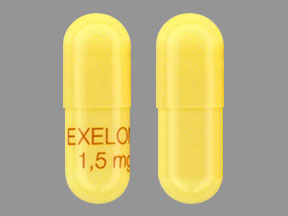Exelon Dosage
Generic name: RIVASTIGMINE TARTRATE 1.5mg
Dosage form: capsules and oral solution
Drug class: Cholinesterase inhibitors
Medically reviewed by Drugs.com. Last updated on Dec 18, 2024.
Dosing in Alzheimer’s Disease
EXELON should be taken with meals in divided doses in the morning and evening.
The recommended dosage of EXELON Oral Solution and EXELON Capsules in Alzheimer’s disease (AD) is 6 mg to 12 mg per day, administered twice a day (daily doses of 3 mg to 6 mg twice a day). There is evidence from the clinical trials that doses at the higher end of this range may be more beneficial.
Initial Dose
Initiate treatment with the 1.5 mg twice a day with EXELON.
Dose Titration
After a minimum of 2 weeks and if well tolerated, increase the dose to 3 mg twice a day. Subsequent increases to 4.5 mg twice a day and 6 mg twice a day should be attempted after a minimum of 2 weeks at the previous dose and if well tolerated. The maximum dose is 6 mg twice a day (12 mg per day).
Dosing in Parkinson’s Disease Dementia
EXELON should be taken with meals in divided doses in the morning and evening.
The dosage of EXELON shown to be effective in the single controlled clinical trial conducted in dementia associated with Parkinson’s disease is 3 mg to 12 mg per day, administered twice a day (daily doses of 1.5 mg to 6 mg twice a day).
Initial Dose
Initiate treatment with the 1.5 mg twice a day with EXELON.
Dose Titration
After a minimum of 4 weeks and if well tolerated, increase the dose to 3 mg twice a day. Subsequent increases to 4.5 mg twice a day and 6 mg twice a day should be attempted after a minimum of 4 weeks at the previous dose and if well tolerated. The maximum dose is 6 mg twice a day (12 mg per day).
Interruption of Treatment
If adverse effects (e.g., nausea, vomiting, abdominal pain, loss of appetite) cause intolerance during treatment, the patient should be instructed to discontinue treatment for several doses and then restart at the same or next lower dose level.
If dosing is interrupted for 3 days or fewer, restart treatment with the same or lower dose of EXELON. If dosing is interrupted for more than 3 days, treatment should be restarted with 1.5 mg twice a day and titrated as described above.
Dosing in Specific Populations
Dosing Modifications in Patients with Renal Impairment
Patients with moderate and severe renal impairment may be able to only tolerate lower doses.
Dosing Modifications in Patients with Hepatic Impairment
Patients with mild (Child-Pugh score 5 to 6) and moderate (Child-Pugh score 7 to 9) hepatic impairment may be able to only tolerate lower doses. No data are available on the use of rivastigmine in patients with severe hepatic impairment.
Dosing Modifications in Patients with Low Body Weight
Carefully titrate and monitor patients with low body weight (less than 50 kg) for toxicities (e.g., excessive nausea, vomiting), and consider reducing the dose if such toxicities develop.
Important Administration Instructions
Caregivers should be instructed in the correct procedure for administering EXELON Oral Solution. In addition, they should be directed to the Instruction Sheet (included with the product) describing how the solution is to be administered. Caregivers should direct questions about the administration of the solution to either their physician or pharmacist.
Patients should be instructed to remove the oral dosing syringe provided in its protective case, and using the provided syringe, withdraw the prescribed amount of EXELON Oral Solution from the container. Each dose of EXELON Oral Solution may be swallowed directly from the syringe or first mixed with a small glass of water, cold fruit juice, or soda. Patients should be instructed to stir and drink the mixture.
EXELON Oral Solution and EXELON Capsules may be interchanged at equal doses.
Frequently asked questions
More about Exelon (rivastigmine)
- Check interactions
- Compare alternatives
- Pricing & coupons
- Reviews (15)
- Drug images
- Side effects
- During pregnancy
- Generic availability
- Drug class: cholinesterase inhibitors
Patient resources
- Exelon drug information
- Exelon (Rivastigmine Oral) (Advanced Reading)
- Exelon (Rivastigmine Transdermal) (Advanced Reading)
Professional resources
Related treatment guides
See also:
Further information
Always consult your healthcare provider to ensure the information displayed on this page applies to your personal circumstances.


